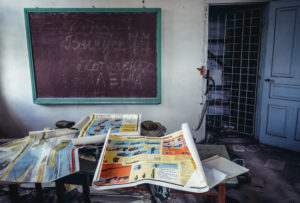On the 25th June we hosted our fourth online event, “Through the Lens of Transition, “Education, Interrupted,” with three speakers: Alicja Pacewicz, a Polish economist, social and educational activist and co-founder of the Center for Citizenship Education with Class Foundation, and an expert of the Polish Ministry of National Education and the Central Examination Board; Caroline Hornstein-Tomić, a Research Advisor at the Institute of Social Sciences Ivo Pilar in Croatia, specialising in high-skilled and return migration and related policies, identity politics, post-socialist transformation and state building processes, and also co-founder and Chair of the Management Board of the Zagreb based foundation Wissen am Werk / Znanje na djelu; and Veronika Ludwig, formerly teacher of German as a foreign and technical language at Jiangsu Teachers University of Technology Changzhou, China, as well as a teacher in Integration Courses, and since 2011 a high-school teacher at the Robert-Jungk-Oberschule in Berlin. We looked to discuss the long-term consequences of educational gaps created in transitional times and what teachers and practitioners of education need in order to guide their students through them.
We opened our seminar with discussion of personal stories of education in the transitional period of the late 1980s and early 1990s, with Alicja relating her experience of children’s confusion and anger at the change around them in society and how to help them deal with these feelings in a peaceful way during a time of martial law. Caroline then continued with her experience of Germany’s relationship with its migration background during the transitional period ultimately influencing her future educational career. Viktoria followed this with her experience of her teacher giving her class “Lord of the Flies” during this time in order to help them understand how societal change happens in groups.
The discussion then moved onto obstacles surrounding the ways in which education changes during unprecedented times, one of the main themes of which being the lack of trust in favour of higher control, which often has presented issues in the face of reforming times when “obedience” is prioritised. Particularly, as Caroline noted, this comes into play when wishing to “encourage debate, discussion and controversy… diving into these issues and encouraging students to understand that there are different points of view on issues.”
We then moved onto the opportunities for the educational system to reform itself in light of the pandemic and how this may pan out, especially with the “digital push” of education online and the issue of its sustainability when teachers are retiring at an increasing rate. We discussed the need for standardisation of teachers in online settings so that accessibility for pupils remains the same. We closed with comparing the transitions and their effects: that of 30 years ago, and that of today. Although Alicja explained that she found the two transitions “incomparable,” she saw similarities in the way they generated hope: “Hope that this challenge is common for all of us. Maybe we will all see how education has to change. As a paradigm, not just in content or methods. It has to change in a fundamental way. Maybe the coronavirus will give us the push, not just for more digital education, but for a better education, better adapted for the future world that we and our students are going to create.”
Education, Interrupted:
Image Credit: Adobe

